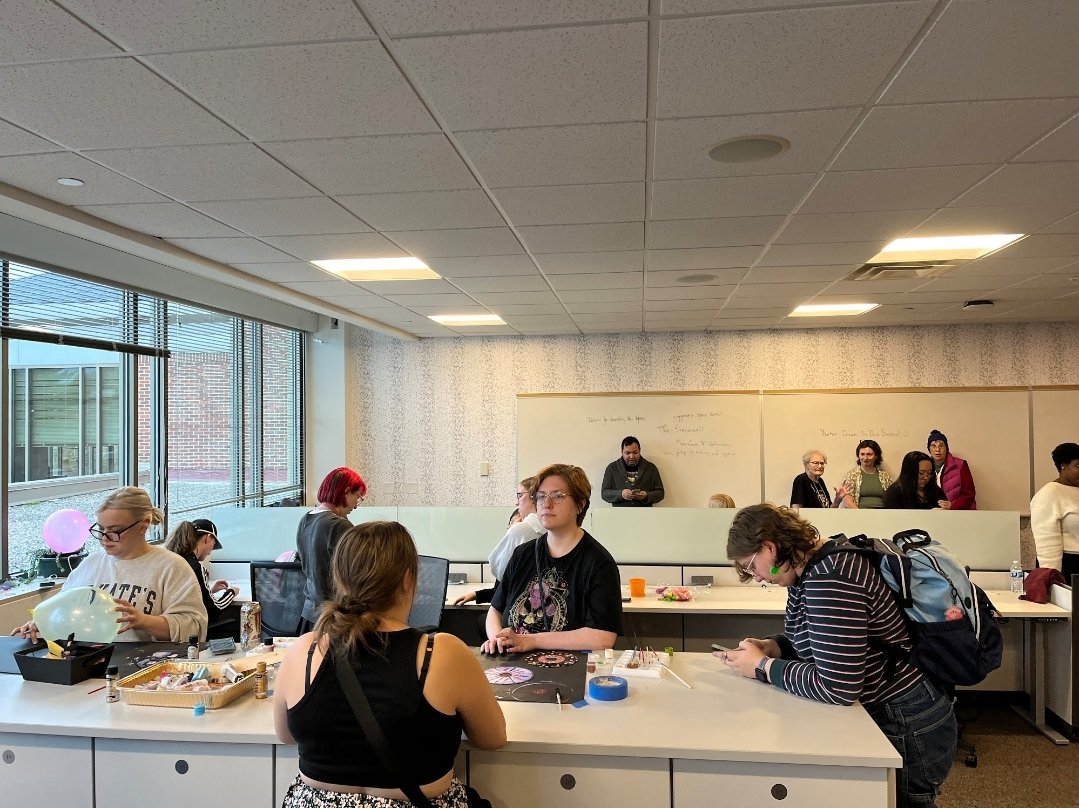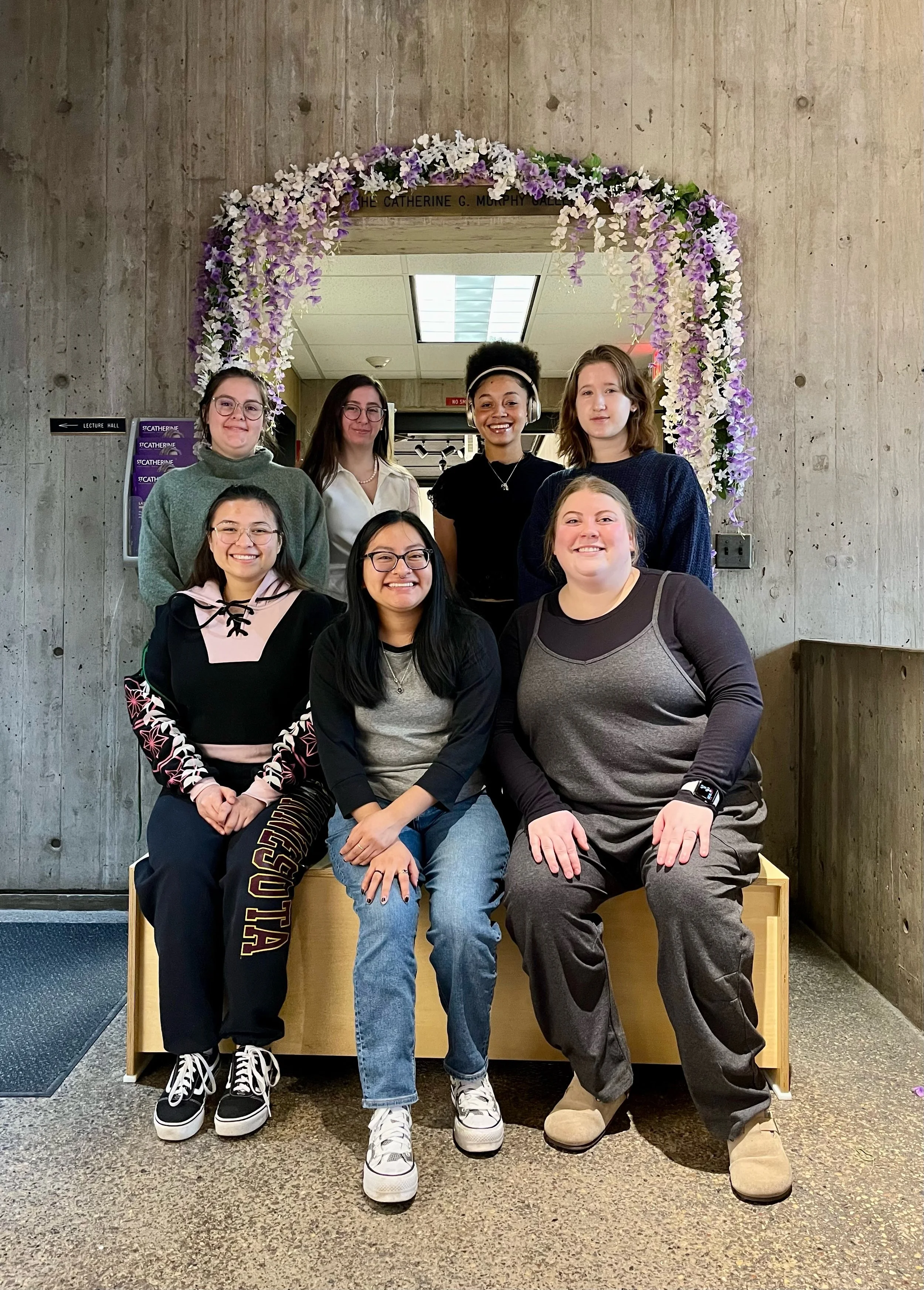QSA space to move into Center for Women
By Mia Timlin
On Friday, April 19, students received a university-wide email detailing new plans to move the Queer Student Alliance space and consolidate it with the Abigail Quigley McCarthy Center for Women. This change follows the opening of the Queer Student Lounge in CdC 355 just this past October, which has had the QSA sharing a space with Katie’s Closet for the past seven months.
The statement sent out to students cites the new permanent location as one where “interests of students with diverse gender and sexual identities at St. Kate’s” will be able to enjoy “more outreach, support and resources” without any disruption to the current programming within the Center for Women. The email also attributes the decision to find a more permanent location for the QSA as a response to the student demands in the spring 2022 student protest to “invest in a LGBTQIA+ physical space in the Coeur de Catherine. Do not cut corners by merging MIPS and LGBTQIA+ student services.”
The current queer student space in CdC 355. Credit: M Yeager
In a statement for The Wheel, Vice President of Student Affairs and Dean of Students JoNes VanHecke wrote, “joining the Abigail Quigley McCarthy Center for Women’s space, next door to the Center for Intercultural Development, represents the shifting of this campus’s needs as well as an extension of the mission reflected in the Center for Women’s history, which has focused on intersectionality and consistently advocated for individuals from all backgrounds and identities. One does not usurp the other, but rather each amplifies the other’s voice.”
While this new placement would give the QSA a more central location on the second floor of the CdC, not all of the students who will utilize the space see it as the best solution.
QSA President H Hausman ‘24 (Biology, Longevity and Aging minor) said their initial reaction to being told of the change and given a tour of the space prior to the email going out to the student body, was disappointment.
“We walked in — it’s someone’s old office,” Hausman said. “It’s office space-sized. And there were three of us, adult humans, in the office and it felt cramped with us just standing in there.”
Hausman also stressed that the combination of the QSA and the Center for Women has a few issues, the first being privacy.
Hausman said that the QSA’s current arrangement with Katie’s Closet doesn’t allow for the sense of safety and security that a queer student lounge is meant to offer students, and they don’t see the shift into the Women’s Center being better.
“The new space they want us in is in the back of the Center for Women, so we’d have to walk through an entire center to get to our lounge,” Hausman said. “That doesn’t feel safe, secluded, you know? It’s not private in case students don’t want to be seen utilizing the space in a sense that outs them.”
Hausman also pointed out the contradiction of housing the queer space within a space with a gendered mission in name.
“[It’s] not all-encompassing of the gender identities that St. Kate’s has,” Hausman said. “There’s trans-masculine and male people here, [who are] part of the queer community. And that’s the Center for Women. I mean, there’s non-binary people in the club and they have to go into the Center for Women. That’s where they go. And that’s not affirming.”
As an answer to the student demand made in 2022 for a queer space on campus, Hausman doesn’t view this as a genuine effort to prioritize the queer students at St. Kate’s. This was a view shared by another student, Leena Abdulla ‘24 (Sociology/Critical Studies of Race and Ethnicity), who said that the space change doesn’t align with the demand for a space and staff for queer students that is their own.
“It was one thing to not have our demands from 2022 fully met but it was especially disheartening to feel like decisions that students don’t want are being attributed to the student protest of 2022,” Abdulla said.
This is part of a wider conversation on how students are consulted on decisions that will majorly impact them.
“As soon as I was told it was final,” said Hausman on the news that their new home would be in The Center for Women, “most of the people that I talked to, like staff and office workers, didn’t even know it was final until the university-wide email. So people didn’t even know ahead of time. The Center for Women, the student workers and workers in there, didn’t know that they were going to be sharing a space. And yeah, that office isn’t utilized right now, but still, it’s their space.”
2024-25 Senate President Luul Adam ‘25 (Undecided) commented on the lack of transparency within the decision.
"When making a decision that will impact students, it is necessary to be inclusive of their voices, concerns, wants and needs,” Adam said. “Above all things we should strive to collaborate as a community in such matters and uphold our values of social justice by reaching a community-based decision. Transparency becomes meaningless when students are excluded from all stages of such an initiative and decisions are made on their behalf."
Hausman also added that this all felt like part of an ongoing battle for space on campus that comes from forcing students to advocate for the resources they shouldn’t have to be advocating for.
“It’s seeming like St. Kate’s is pitting different student identity groups against each other in a sense,” Hausman said. “Now it’s like, we’re arguing over space with Muslim students who need a prayer space, because that’s important. The other student groups that use the Center for Women, you know, the Asian-American group, I think the LSA meets in there. Now it’s like we’re all arguing for space and I think so many solutions could be thought up and I don’t think it should be creating tension between the students.”
Students should expect to see the space transition taking effect later this summer, but it is not without some trepidation. Hausman, and many other queer students on campus, just want a space where they can feel safe, secure and learn about their identities.
“St. Kate’s is a school, and it’s a school that doesn’t provide or support for their queer students ,so it’s important to have that space and those resources,” Hausman said. “‘Cause what about students that didn’t even get any sort of queer education in their high school and growing up? And now they’re in college and they still don’t see any resources. If you don’t understand your identity, and what resources you have available to you on and off campus, that’s a safety concern.”
You can learn more about the spring 2022 student protest here, and access the list of student demands here.







